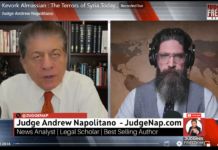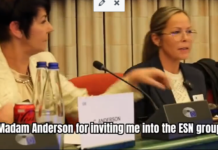Transcript by Rawan Mahmasa
Well, I’ve had personally the privilege of witnessing the poverty, the trauma, the displacement due to suffered by local communities in Damascus, Saydnaya, Latakia, Maaloula, Homs and at last of Aleppo, visited several times. And I continue to seek to raise the suffering of the people in parliament. Just as a reminder, over nine million Syrians are food insecure at the moment, and an estimated nine out of 10 live below the poverty line and million Syrians in parliament and the suffering of the people.
And in January this year, I sent a letter to the British prime minister, Boris Johnson, to urge the lifting of economic sanctions against Syria. The letter was signed by 80 other people, including many colleagues in the House of Lords, two former British ambassador to Syria, one of them, my friend Peter Ford, and other people from different arenas, George Tenet, the former Chief of General Staff of the British Army, north west of spitted former First Sea Lord and Chief of Naval Staff.
And someone you heard earlier, of course, the right Reverend Dr. Ted Williams, the former Archbishop of Canterbury and many other people. It was also signed by international diplomats, human rights experts and some of the most senior church leaders in the Middle East. They briefly on this is the Prime Minister for the call to the United Nations’ Special Rapporteur on unilateral coercive measures. And they don’t do it. Who appealed at the end of December, the United States, to lift its complex web of economic sanctions that severely harm the people of Syria.
Sanctions that have not been approved by the UN Security Council. The Special Rapporteur stated that US sanctions, I quote, violate the human rights of Syrian people and also could exacerbate the already humanitarian situation in Syria, especially in the case of Covid-19 pandemic, end of quote. They suffer what they call suffering by blocking the aid, trade and investment necessary, the serious health system and economy to function. The Special Rapporteur’s findings reflect a growing consensus within humanitarian aid and human rights communities that the sanctions are driving Syria into an unprecedented humanitarian catastrophe. I could give a lot more details. You’ve had enough already, and I know speaking out of turn because of our network connections. But I would just highlight the sanctions kill just as surely as bombs dropped.
Bombs can be aimed at military targets and sometimes, unfortunately, civilian targets and the sanction regimes nearly everyone suffers from in Syria. Effects have been devastating. Millions of people out of work, skyrocketing prices and poverty, a crippled health care system and hunger and death for many of the most vulnerable. It is high time the undeclared economic war being waged against the Syrian people by the United States, United Kingdom, European Union and their allies to come to an end.
And I hope very much that the important conference will help to bring that around.
So moving from there tonight, from there, sorry, I move to what I should do, which is to have the great privilege of giving what I just like to offer a very profound vision thanks to all the distinguished people, because this is very, very important conflict.
We’ve been so fortunate to work with speakers from Syria, from the front line of faith and freedom and other experts from around the world, and most importantly, to hear voices in country who don’t hear enough of in Britain and to hear the heartbreaking realities that exist in Syria today and to hear the truths that are so often hidden in mainstream narratives.
And you have to just the BBC like I do, I’ve complained again about the hypocrisy of the coverage of Syria related to areas in the region.
So a huge many of those who face the pressure, so many people have a lot of pressure not to take part in such a conference.
They’ve had the courage to speak out and they will pay a high price. But we’re here because we believe we believe in the truth. We believe in the need because of the suffering. The people of the Syrian crisis began 10 years ago today. The suffering of the Syrian people has gone on, as we all know, to be here for far too long. And the current policies of the international community are only prolonging violence and instability in the country and compounding the profound suffering of millions of people, innocent people.
So I passionately hope that the voices today will promote. A path to stability and peace. And finally, of course, thank you so much, Dr. Makram and the European Center for the Study of Extreme Extremism. And disorganized, because I’ve been running around trying to get my network and organize this very important event, but seriously, I’m sure we all hope and pray that what we have heard today echoes in the corridors of power. And challenges the people to reflect on the too often unreported realities in this context.
And as I say, very, very biased reporting which I’m sure we’re all aware of, and to support Syria to decide its own future and to rebuild your magnificent country, its wonderful history in a way that is the wishes of the Syrian people and to bring hope, peace and freedom for your people. You’ve suffered for far too long without it. You’ve deserved it for a long time. And I’m sure everyone has taken part in this very, very important conference, which we do thank you very much for arranging, will agree that it is long overdue that the people of Syria are respected for wonderful history, respected for your civilization, and respected for the contribution you can make the world when countries such as the United States and my own country stop penalizing you and allow you to develop your own justice, peace, freedom and democracy.















